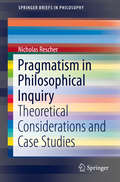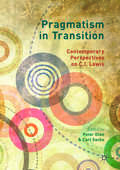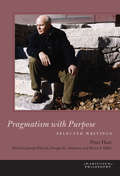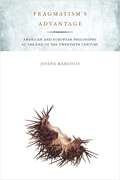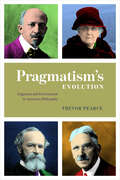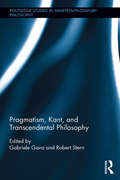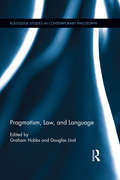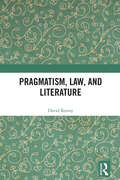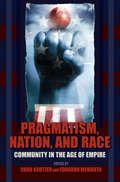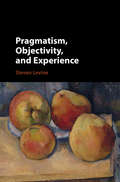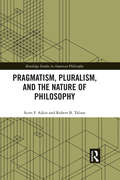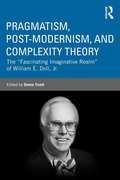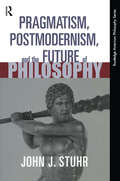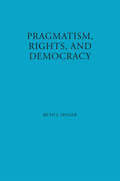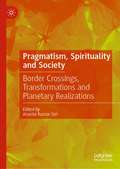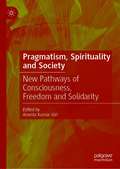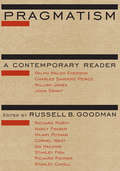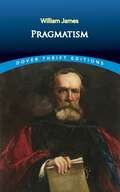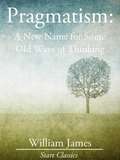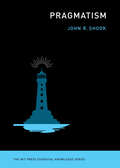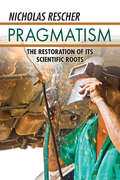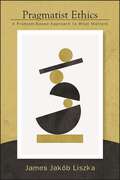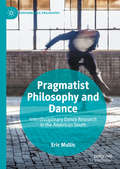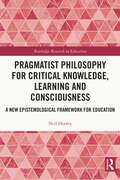- Table View
- List View
Pragmatism as a Way of Life: The Lasting Legacy of William James and John Dewey
by Hilary PutnamHilary Putnam argues that all facts are dependent on cognitive values. Ruth Anna Putnam turns the problem around, illuminating the factual basis of moral principles. Together, they offer a pragmatic vision that in Hilary’s words serves “as a manifesto for what the two of us would like philosophy to look like in the twenty-first century and beyond.”
Pragmatism in Philosophical Inquiry
by Nicholas RescherThis book showcases the history and theory of pragmatism and its alignment to the sensibilities of contemporary analytic philosophy. It does this not only by describing its mode of operation and explaining its legitimating rationale, but also by substantiating its claims by a series of instructive case studies. The unifying insight of this approach is that the natural criterion of merit within any goal-oriented enterprise--be its orientation practical or cognitive--pivots on its contribution to the effective and efficient realization of the aims at issue. The aim of this volume is to describe and illustrate this broadened conception of pragmatism as a far-reaching and many-sided approach to philosophical inquiry. Theoretical considering apart, it offers a variety of case studies to illustrate the range and fertility of this approach. Nicholas Rescher has published extensively on the history and theory of pragmatism and on its alignment to the sensibilities of contemporary analytic philosophy over the last 30 years.
Pragmatism in Transition
by Peter Olen Carl SachsThis collection is an attempt by a diverse range of authors to reignite interest in C. I. Lewis's work within the pragmatist and analytic traditions. Although pragmatism has enjoyed a renewed popularity in the past thirty years, some influential pragmatists have been overlooked. C. I. Lewis is arguably the most important of overlooked pragmatists and was highly influential within his own time period. The volume assembles a wide range of perspectives on the strengths and weaknesses of Lewis's contributions to metaphysics, epistemology, semantics, philosophy of science, and ethics.
Pragmatism with Purpose: Selected Writings (American Philosophy)
by Peter Hare Douglas R. Anderson Steven A. MillerPragmatism with Purpose collects essays by the late Peter Hare, a leading proponent of the American philosophical tradition. The volume includes essays on “holistic pragmatism” that Hare developed in conversation with Morton White, as well as historical articles on William James and C. S. Peirce and commentaries on the profession.
Pragmatism's Advantage: American and European Philosophy at the End of the Twentieth Century
by Joseph MargolisThis book addresses the rift between major philosophical factions in the United States, which the author describes as a "philosophically becalmed" three-legged creature made up of analytic philosophy, continental philosophy, and pragmatism. Joseph Margolis offers a modified pragmatism as the best way out of this stalemate. Whether he is examining Heidegger or rethinking the foibles of Dewey, Rorty, and Peirce, much of nineteenth- and twentieth-century Western philosophy comes into play as Margolis presents his history of philosophy's evolution and defends his views. He does not, however, mean for philosophy to turn to the pragmatism of yore or even to its revival in the 1970s. Rather, he finds in recent approaches to pragmatism a middle ground between analytic philosophy's scientism (and its disinterest in analyzing human nature)and continental philosophy's reliance on attributing transcendental powers to mere mortals.
Pragmatism's Evolution: Organism and Environment in American Philosophy
by Trevor PearceIn Pragmatism’s Evolution, Trevor Pearce demonstrates that the philosophical tradition of pragmatism owes an enormous debt to specific biological debates in the late 1800s, especially those concerning the role of the environment in development and evolution. Many are familiar with John Dewey’s 1909 assertion that evolutionary ideas overturned two thousand years of philosophy—but what exactly happened in the fifty years prior to Dewey’s claim? What form did evolutionary ideas take? When and how were they received by American philosophers? Although the various thinkers associated with pragmatism—from Charles Sanders Peirce to Jane Addams and beyond—were towering figures in American intellectual life, few realize the full extent of their engagement with the life sciences. In his analysis, Pearce focuses on a series of debates in biology from 1860 to 1910—from the instincts of honeybees to the inheritance of acquired characteristics—in which the pragmatists were active participants. If we want to understand the pragmatists and their influence, Pearce argues, we need to understand the relationship between pragmatism and biology.
Pragmatism, Kant, and Transcendental Philosophy (Routledge Studies in Nineteenth-Century Philosophy)
by Robert Stern Gabriele GavaPhilosophers working within the pragmatist tradition have pictured their relation to Kant and Kantianism in very diverse terms: some have presented their work as an appropriation and development of Kantian ideas, some have argued that pragmatism is an approach in complete opposition to Kant. This collection investigates the relationship between pragmatism, Kant, and current Kantian approaches to transcendental arguments in a detailed and original way. Chapters highlight pragmatist aspects of Kant’s thought and trace the influence of Kant on the work of pragmatists and neo-pragmatists, engaging with the work of Peirce, James, Lewis, Sellars, Rorty, and Brandom, among others. They also consider to what extent contemporary approaches to transcendental arguments are compatible with a pragmatist standpoint. The book includes contributions from renowned authors working on Kant, pragmatism and contemporary Kantian approaches to philosophy, and provides an authoritative and original perspective on the relationship between pragmatism and Kantianism.
Pragmatism, Law, and Language (Routledge Studies in Contemporary Philosophy)
by Graham Hubbs Douglas LindThis volume puts leading pragmatists in the philosophy of language, including Robert Brandom, in contact with scholars concerned with what pragmatism has come to mean for the law. Each contribution uses the resources of pragmatism to tackle fundamental problems in the philosophy of language, the philosophy of law, and social and political philosophy. In many chapters, the version of pragmatism deployed proves a fruitful approach to its subject matter; in others, shortcomings of the specific brand of pragmatism are revealed. The result is a clearer understanding of what pragmatism has meant and can mean across these tightly related philosophical areas. The book, then, is itself pragmatism in action: it seeks to clarify its unifying concept by examining the practices that centrally involve it.
Pragmatism, Law, and Literature
by David KennyThis book uses literary examples to make the case for understanding law and the legal system through the lens of philosophical pragmatism.For pragmatists, experience is everything; they argue against understanding the world through any abstraction, maintaining that it is simply too complicated to fit into categories or theories. Legal pragmatism is the application of this philosophy to the making of law, the practice of law, and the practice of judging. This book maintains that the best way to understand legal pragmatism is not through bare theoretical exegesis but through literature: that is, through stories that cast light on various pragmatic aspects of law. Engaging a range of literary sources, including works by Seamus Heaney, Hilary Mantel, Harper Lee, and Ian McEwan, the book makes a compelling case for the contemporary relevance of pragmatism.This book will appeal to legal theorists, law and literature/humanities scholars, readers of literary criticism, and those with interests in pragmatist philosophy.
Pragmatism, Nation, and Race: Community in the Age of Empire
by Eduardo Mendieta Chad KautzerPragmatism has been called "the chief glory of our country's intellectual tradition" by its supporters and "a dog's dinner" by its detractors. While acknowledging pragmatism's direct ties to American imperialism and expansionism, Chad Kautzer, Eduardo Mendieta, and the contributors to this volume consider the role pragmatism plays, for better or worse, in current discussions of nationalism, war, race, and community. What can pragmatism contribute to understandings of a diverse nation? How can we reconcile pragmatism's history with recent changes in the country's racial and ethnic makeup? How does pragmatism help to explain American values and institutions and fit them into new national and multinational settings? The answers to these questions reveal pragmatism's role in helping to nourish the fundamental ideas, politics, and culture of contemporary America.
Pragmatism, Objectivity, and Experience
by Steven LevineIn this book Steven Levine explores the relation between objectivity and experience from a pragmatic point of view. Like many new pragmatists he aims to rehabilitate objectivity in the wake of Richard Rorty's rejection of the concept. But he challenges the idea, put forward by pragmatists like Robert Brandom, that objectivity is best rehabilitated in communicative-theoretic terms - namely, in terms that can be cashed out by capacities that agents gain through linguistic communication. Levine proposes instead that objectivity is best understood in experiential-theoretic terms. He explains how, in order to meet the aims of the new pragmatists, we need to do more than see objectivity as a norm of rationality embedded in our social-linguistic practices; we also need to see it as emergent from our experiential interaction with the world. Innovative and carefully argued, this book redeems and re-actualizes for contemporary philosophy a key insight developed by the classical pragmatists.
Pragmatism, Pluralism, and the Nature of Philosophy (Routledge Studies in American Philosophy)
by Robert B. Talisse Scott F. AikinFor the past fifteen years, Aikin and Talisse have been working collaboratively on a new vision of American pragmatism, one which sees pragmatism as a living and developing philosophical idiom that originates in the work of the "classical" pragmatisms of Charles Peirce, William James, and John Dewey, uninterruptedly develops through the later 20th Century pragmatists (C. I. Lewis, Wilfrid Sellars, Nelson Goodman, W. V. O. Quine), and continues through the present day. According to Aikin and Talisse, pragmatism is fundamentally a metaphilosophical proposal – a methodological suggestion for carrying inquiry forward amidst ongoing deep disagreement over the aims, limitations, and possibilities of philosophy. This conception of pragmatism not only runs contrary to the dominant self-understanding among cotemporary philosophers who identify with the classical pragmatists, it also holds important implications for pragmatist philosophy. In particular, Aikin and Talisse show that their version of pragmatism involves distinctive claims about epistemic justification, moral disagreement, democratic citizenship, and the conduct of inquiry. The chapters combine detailed engagements with the history and development of pragmatism with original argumentation aimed at a philosophical audience beyond pragmatism.
Pragmatism, Post-modernism, and Complexity Theory: The "Fascinating Imaginative Realm" of William E. Doll, Jr. (Studies in Curriculum Theory Series)
by Edited by Donna TrueitThe first collection of the key works of the major curriculum studies scholar William E. Doll, Jr., this volume provides an overview of his scholarship over his fifty-year career and documents the theoretical and practical contribution he has made to the field . The book is organized in five thematic sections: Personal Reflections; Dewey, Piaget, Bruner, Whitehead: Process And Transformation; Modern/Post-Modern: Structures, Forms and Organization; Complexity Thinking; and Reflections on Teaching . The complicated intellectual trajectory through pragmatism, postmodernism and complexity theory not only testifies to Doll’s individual lifetime works but is also intimately related to the landscape of education to which he has made an important contribution. Of interest to curriculum scholars around the world, the book will hold special significance for graduate students and junior scholars who came of the age in the field Doll helped create: one crafted by postmodernism and, more recently, complexity theory.
Pragmatism, Postmodernism and the Future of Philosophy
by John J. StuhrFirst published in 2003. Routledge is an imprint of Taylor & Francis, an informa company.
Pragmatism, Rights, and Democracy (American Philosophy #No. 11)
by Beth J. Singer"Singer's theory of rights, an impressive development of social accounts by pragmatists George Herbert Mead and John Dewey, was developed in Operative Rights (1993). This successor volume includes applications, lectures, replies to critics, and clarifications. For Singer, Dewey, and Mead, rights exist only if they are embedded in the operative practices of a community. People have a right in a community if their claim is acknowledged, and if they would acknowledge similar claims by others. Singer's account contrasts with theories of natural rights, which state that humans have rights by virtue of being human. Singer's account also differs from Kantian attempts to derive rights from the necessary conditions of rationality. While denying that rights exist independently of a community's practices, Singer maintains that rights to personal autonomy and authority ought to exist in all communities. Group rights, an anathema among individualistic theories, are from Singer's pragmatist perspective a valuable institution. Singer's discussion of rights appropriate for minority communities (e.g., the Bosnian Muslims and the Canadian Quebecois) is particularly illuminating. Her book is a model of careful reasoning. General libraries, and certainly academic libraries, should have Singer's Operative Rights. The volume under review is a good addition for research libraries and recommended for graduate students and above."[Singer] examines the views of Rousseau, Mill, and T. H. Green on human rights and those of Dewey and G. H. Mead on the relationship between rights and the democratic process...Recommended."--Choice
Pragmatism, Spirituality and Society: Border Crossings, Transformations and Planetary Realizations
by Ananta Kumar GiriThis book explores border crossing among pragmatism, spirituality and society. It opens up American pragmatism to dialogues with pragmatism and spiritual quest from other traditions such as India and China thus making contemporary pragmatism a part of much needed planetary conversations. It cultivates new visions and practices of spiritual pragmatism building upon the seminal works of Charles Sanders Pierce, William James, Sri Aurobindo, John Dewey, Martin Heidegger, Mahatma Gandhi, B.R. Ambedkar, Ludwig Wittgenstein and Luce Irigaray which can help us rethink and transform conventional conceptions and constructions of practice, pragmatism, language, religion, politics, society, culture and democracy and create new relationships of pragmatism, spirituality and society.
Pragmatism, Spirituality and Society: New Pathways of Consciousness, Freedom and Solidarity
by Ananta Kumar GiriThis book explores the dynamics of interaction between pragmatism and spirituality in the constitution and working of consciousness, freedom and solidarity. This book is cross-cultural and transdisciplinary in nature and brings critical and transformative perspectives from different philosophical and spiritual traditions of the world. It discusses the works of seminal thinkers such as William James, Rudolf Steiner, John Dewey, Swami Vivekananda, Martin Heidegger, Claude Levi-Strauss, Jordan Peterson, Slavos Zizek, Paul Valeri and O.V. Vijayan. It also explores dialogues between pragmatism and other philosophical and intellectual traditions such as Semiotics, Saiva Siddhanta, Vedanta, Trika Shaivism and Tantra. It explores themes such as pragmatism and belief, evolution of consciousness and happiness, spiritual pragmatism and economics of solidarity, value levels democracy, the perforamtive as an aspect of spirituality and transformation of political theology from Kingdom of God to Gardens of God.
Pragmatism: A Contemporary Reader
by Russell B. GoodmanRussell Goodman examines the curious reemergence of pragmatism in a field dominated in the past decades by phenomenology, logic, positivism, and deconstruction. With contributions from major contemporary and classical thinkers such as Cornel West, Richard Rorty, Nancy Fraser, Charles Sanders Peirce, and Ralph Waldo Emerson, Russell has gathered an impressive chorus of philosophical voices that reexamine the origins and complexities of neo-pragmatism. The contributors discuss the relationship of pragmatism and literary theory, phenomenology, existentialism, and the work of Ralph Waldo Emerson. They question the meaning of pragmatics, what it is to be practical, and ask provocative questions such as: what is reading? and whether democracy is a precondition for the functioning of intelligence. This work places this reemergent and interesting neo-development in its proper context and will provide readers with a strong sense of the movement's foundations, history, and subtlities.
Pragmatism: A New Name For Some Old Ways Of Thinking (Dover Thrift Editions)
by William JamesA profoundly influential figure in American psychology, William James (1842–1910) was also a philosopher of note, who used Charles S. Peirce's theories of pragmatism as a basis for his own conception of that influential philosophy. For James, this meant an emphasis on "radical empiricism" and the concept that the meaning of any idea — philosophical, political, social, or otherwise — has validity only in terms of its experiential and practical consequences. <P><P> James propounded his theories of pragmatism in this book, one of the most important in American philosophy. In a sense, he wished to test competing systems of thought in the "marketplace of actual experience" to determine their validity, i.e. whether adopting a particular philosophical theory or way of looking at the world makes an actual difference in individual conduct or in how we perceive and react to the varieties of experience. In these pages, James not only makes a strong case for his own ideas, but mounts a powerful attack against the transcendental and rationalist tradition. <P><P> For anyone interested in William James or the history of American philosophical thought, Pragmatism is an essential and thought provoking reference. In this handy, inexpensive edition, it will challenge and stimulate any thinking person.
Pragmatism: A New Name for Some Old Ways of Thinking
by William JamesThe word pragmatism is used everywhere today, from business to sports to politics. Although the word hadn't yet entered everyday language when William James published "Pragmatism" in 1907, the philosopher believed its doctrine had virtually become common sense in twentieth-century America. For James, pragmatism was a specific philosophical alternative to essentialism and foundationalism and argued that ideas are meaningful only insofar as they have practical consequences in concrete human experience; however today pragmatism has come to denote merely a general willingness to compromise principles, even to the point of selfishness or irresponsibility. Written in an engaging and accessible style, "Pragmatism" is a valuable corrective to modern uses of the word, since the voice that speaks in its pages embodies precisely the opposite values from the pejorative semes the word has acquired.
Pragmatism: An Annotated Bibliography 1898-1940 (The MIT Press Essential Knowledge series #66)
by John R. ShookA concise, reader-friendly overview of pragmatism, the most influential school of American philosophical thought.Pragmatism, America&’s homegrown philosophy, has been a major intellectual movement for over a century. Unlike its rivals, it reaches well beyond the confines of philosophy into concerns and disciplines as diverse as religion, politics, science, and culture. In this concise, engagingly written overview, John R. Shook describes pragmatism&’s origins, concepts, and continuing global relevance and appeal. With attention to the movement&’s original thinkers—Charles Sanders Peirce, William James, John Dewey, and George Herbert Mead—as well as its contemporary proponents, he explains how pragmatism thinks about what is real, what can be known, and what minds are doing. And because of pragmatism&’s far-reaching impact, Shook shows how its views on reality, truth, knowledge, and cognition coordinate with its approaches to agency, sociality, human nature, and personhood.
Pragmatism: The Restoration of Its Scientific Roots
by Nicholas RescherPragmatism is rooted in the linking of practice and theory. It describes a process where theory is extracted from practice, and applied back to practice to form what is called intelligent practice. Pragmatism was intended, by Charles S. Peirce, its founder, as a doctrine for the rational substantiation of knowledge claims. For Peirce, what mattered was successful prediction and control. Practice was to serve as the arbiter of theory. Objective efficacy, not personal satisfaction, is what matters for fixing opinion in a community of rational inquirers.According to Nicholas Rescher, later pragmatists saw the matter differently. They envisioned subjective satisfactions, rather than objectively determinable functional effectiveness, as being the aim of the enterprise. Rescher notes that William James, in particular, had an agenda different from that of Peirce.The two pragmatisms are complete opposites, Rescher argues, in terms of claims and intentions. James's soft pragmatism abandons the classical idea of inquiry as the paramount of truth; it believes that truth is an illusion, an unrealizable figment of the imagination. By contrast, Peirce's hard pragmatism believes that the classic idea of truth remains valid. Rescher seeks to examine and explore pragmatism dialectically, with a conviction that brings pragmatism to life for specialist and generalist alike.
Pragmatist Ethics: A Problem-Based Approach to What Matters (SUNY series in American Philosophy and Cultural Thought)
by James Jakób LiszkaGrounded in American pragmatism, Pragmatist Ethics proposes a rethinking of ethics. Rather than looking to the good—a concept for which consensus is difficult to achieve—pragmatists instead advocate for tending to the problems of the day. James Jakób Liszka examines how daily practices and institutions are originally conceived and then evolve to solve certain problems, and that their failure to do so is the source of most problems. Liszka argues that the ethical goal, therefore, is to improve upon these practices and that the sort of practical reasoning that characterizes practices can be enhanced by a more scientific, empirical approach. But how do we know when changes to practices and institutions are progressive? Problems will plague the best of communities; the better community is the one that succeeds best at solving its problems. Pragmatist Ethics examines various accounts of improvement and progress, concluding that the problem-solving effectiveness of communities is the key to progressive changes.
Pragmatist Philosophy and Dance: Interdisciplinary Dance Research in the American South (Performance Philosophy)
by Eric MullisThis book investigates how Pragmatist philosophy as a philosophical method contributes to the understanding and practice of interdisciplinary dance research. It uses the author's own practice-based research project, Later Rain, to illustrate this. Later Rain is a post-dramatic dance theater work that engages primarily with issues in the philosophy of religion and socio-political philosophy. It focuses on ecstatic states that arise in Appalachian charismatic Pentecostal church services, states characterized by dancing, paroxysms, shouting, and speaking in tongues (glossolalia). Research for this work is interdisciplinary as it draws on studio practice, ethnographic field work, cultural history, Pentecostal history and theology, folk aesthetics, anthropological understandings of ecstatic religious rituals, and dance history regarding acclaimed works that have sought to present aspects of religious ecstasy on stage; Doris Humphrey's The Shakers (1931), Mark Godden’s Angels in the Architecture (2012), Martha Clarke’s Angel Reapers (2015) and Ralph Lemon’s Geography trilogy (2005). The project thereby demonstrates a process model of dance philosophy, showing how philosophy and dance artistry intertwine in a specific creative process.
Pragmatist Philosophy for Critical Knowledge, Learning and Consciousness: A New Epistemological Framework for Education (Routledge Research in Education)
by Neil HooleyEmerging from the confusion and chaos of neoliberal economic systems around the world, this book brings together a collection of major philosophical ideas from previous centuries and applies them to the practice of education. The book argues that pragmatist philosophy is the most appropriate to guide the organisation of curriculum, pedagogy and assessment. It outlines a number of philosophical dilemmas, exploring these in relation to particular philosophers and offers philosophical insights for educational practice. Further, the book proposes Critical Praxis Bricolage, an epistemological framework articulating a view that education practices are embedded in a social context. This reshapes formal education from being dominated by the market forces of neoliberalism, into a way of ethical life that respects the dignity and knowledgeability of each person and community regardless of background. Written in a narrative style, Pragmatist Philosophy for Critical Knowledge, Learning and Consciousness provides a philosophical paradigm of experience, culture and inquiry that actively connects with human interests of the everyday and with the distinctiveness of being human. This work will be of interest to researchers and higher degree students of education and philosophy of education.

